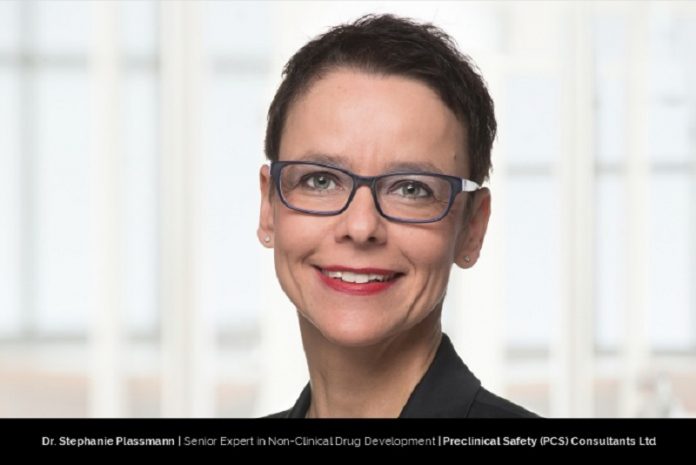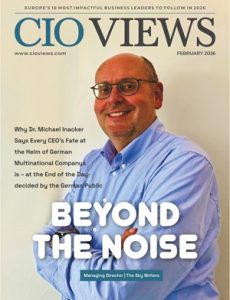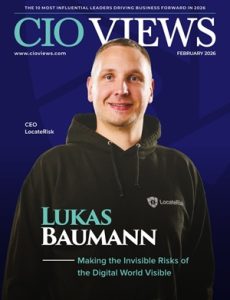Dr. Stephanie Plassmann, Senior Expert in Non-Clinical Drug Development at Preclinical Safety (PCS) Consultants Ltd, is a leader in pharmacology and toxicology helping to save lives with non-clinical drug development.
By training, she is a veterinary surgeon and board-certified veterinary specialist in pharmacology and toxicology. Since 2004, she has acted as an independent consultant for international companies and institutions.
Her expertise focuses on non-clinical pharmacology, toxicology, and drug development, both from a strategic as well as a hands-on operational perspective, comprising a broad spectrum of indications from early to late-stage development.
Stephanie has nearly 30 years of experience in the pharmaceutical industry and held positions including in senior management at F. Hoffmann-La Roche AG (Basel, Switzerland), Switch Biotech AG (Munich, Germany) and Morphochem AG (Munich, Germany).
In 2011, she took over PreClinical Safety (PCS) Consultants Ltd (Basel, Switzerland), an international consultancy in all aspects of non-clinical development from early compound selection through to marketing approval.
Becoming a leader in non-clinical drug development
Starting in big pharma, Stephanie learned non-clinical drug development from scratch, in a GLP-environment, and how it is embedded in the overall process of drug development. She took this forward to her next position as project leader in a small biotechnology company, developing gene therapy in wound healing.
Before she became independent, she served as Vice President Drug Development at Morphochem AG, a biotech company, where she was responsible for both the operational aspects of non-clinical drug development as well as for the overall developmental strategy, comprising all disciplines involved, including clinical, regulatory and portfolio management. The company developed anti-cancer, anti-infective as well as anti-thrombotic drugs.
When Stephanie joined the company in 1999, there were no internal resources available in drug development, as the company was at a research stage. She built up the internal structures, as well as a network of external collaborations, to bring drug candidates from research to clinical development.
“All these disciplines were available when working in a big pharmaceutical company, and it was a huge challenge to take responsibility for the whole process in a biotech company,” she recalls. “I implemented the drug development process by thinking it from the end – i.e. by defining a drug target profile first.”
Non-clinical development cannot start without knowing the condition the clinicians intend to treat. The indication will define clinical, and therefore, non-clinical development.
“At Morphochem, it was the job of my team to define the drug target profile for the molecules the chemist would develop and then to implement the non-clinical testing strategies, in real life, to support clinical development,” she notes.
Growing PCS into an integrated drug development company
From a scientific perspective, preclinical development builds the bridge from bench to bedside, and success means to bring effective drugs on the market in the shortest possible time while maintaining the highest quality standards, to make helpful medicines available to patients as soon as possible.
Stephanie’s idea of implementing translational medicine was to integrate all disciplines involved in the process of drug development, which is extremely complex. There are many small companies with promising research projects, but they need expertise and experience in the field of non-clinical drug development to succeed.
PCS was founded in 1989, and at the outset, the company focused on delivering consulting services in the core safety disciplines, histopathology and toxicology. However, non-clinical development is more than just safety aspects. Stephanie had been working with the company for many years, first as a client, and later as part of the team.
“Since I took over in 2011, I developed the company further in the areas of drug metabolism and pharmacokinetics, non-clinical pharmacology, and quality assurance according to GLP (Good Laboratory Practice), and later to include even clinical pharmacology on a case-by-case basis,” she says.
Today, PCS is recognized in the field as the Integrated Drug Development Company, integrating all disciplines involved in the process of non-clinical drug development from compound selection to regulatory approval, and including the early-stage transition to clinical development.
The company provides independent expert advisory services, non-clinical safety evaluations to the pharmaceutical, agro-chemical, chemical and food industries, to academic institutions engaged in science and research, to business investors and CROs.
PCS’ expertise includes the areas of non-clinical pharmacology, toxicology, toxicopathology, drug metabolism and pharmacokinetics, quality assurance, pharmaceutical development, clinical pharmacology, and regulatory services, including the preparation of regulatory documentation such as IBs, INDs, Briefing Books and CTDs, covering a broad range of indications.
PCS has long-standing, hands-on experience with the full range of test items used in drug development including small molecules, herbals, or biotechnology-derived products, but also with other materials such as food supplements, chemicals, and impurities etc.
An integral part of their services is the successful operational implementation through testing programmes to ultimately build up a comprehensive basis for a robust risk-benefit assessment and quality assurance.
“I could see a strong potential to further expand the potential of the company,” says Stephanie. “Today, our team offers expertise in all areas which are needed for integrated non-clinical drug development, with established hands-on expertise and experience for over 30 years, to support the projects of our clients. I took this risk because I felt I can achieve the most for patients in need by being in charge and taking responsibility.”
Navigating the changing landscape of non-clinical drug development
According to Stephanie, in the last 20 years, the landscape of non-clinical development has changed dramatically, overall resulting in a loss of senior expertise in the pharmaceutical industry.
The drain in non-clinical expertise also affects major pharmaceutical companies, since many of these players outsource operational activities these days rather than to hold resources and build expertise in-house.
On top of that, the biotechnology sector has developed very dynamically, and many innovative products were invented, often by small and mid-size companies with a focus on research rather than development.
So, the demand for senior expertise in the field of non-clinical drug development continues to increase.
Sound non-clinical drug development links the operational aspects, mostly covered by Contract Research Organizations (CROs), with the underlying developmental strategy for a given pharmaceutical drug, both of which must be based on a sound scientific concept to be successful.
The PCS team offers a solution to companies that require this unique expertise, which is lost, or much less available, in many places today, in a broad range of indications and all relevant areas of preclinical drug development, including DART (developmental and reproductive toxicity) and juvenile animal studies (JAS).
“In this field, only a handful of scientists worldwide has senior experience, which the PCS team offers, based on our expertise through hands-on experience for well over 30 years,” says Stephanie. “This is a good example for the shortage of available resources, because specifically in the field of pediatric drug development, there is an increasing demand for expertise, although this is only one of many examples.”
Contributing to the education & training of fellow scientists
Stephanie notes that PCS not only contributes as a consultancy, but also by developing fellow scientists in the field, both as a company, as well as through education and training.
“One of the contributions to the field which I really take to heart is my voluntary activity as a regent for the AGAH (Association for Applied Human Pharmacology, www.agah.eu), a specialist medical-academic organisation focusing on exploratory medicinal product development and human pharmacological research, since many years. The AGAH also contributes to the development of guidance documents,” says Stephanie.
For example, she participated as a delegate, on behalf of the AGAH, as a senior expert in non-clinical drug development in the EMA-meeting for the revision of the European Guideline on Strategies to Identify and Mitigate Risks for First-In-Human and Early Clinical Trials with Investigational Medicinal Products, the revised version of which was implemented in February 2018, following the MAD trial incident with BIA 10-2474 in January 2016.
In the pandemic, PCS contributed to a series of workshops offered by the AGAH to promote the understanding of vaccine development from a non-clinical perspective. Furthermore, since many years, PCS lectures regularly on non-clinical topics such as at the PharmaTrain-certified Introductory AGAH Course in Exploratory Medicines Development. Last not least, PCS also publishes on non-clinical topics.
PCS is recognized to provide high quality service and their team members all make very significant contributions to its success. They work hands-on with clients, taking responsibility for the process – and pride in the success of their projects.
“All of our collaborations are long-term over many years. In addition, we continuously contribute to the field by presenting at scientific conferences and by publishing,” notes Stephanie. “One of our publications, which demonstrates our experience and expertise, is a Book Chapter, authored by my colleague Dr. Elisabeth O’Connor and myself on Critical Aspects of Integrated Non-Clinical Drug Development: Concepts, Strategies and Potential Pitfalls in: A Comprehensive Guide to Toxicology in PreClinical Drug Development. Editor Ali S. Faqi. 2nd edition. We have just submitted the updated manuscript for the next edition.”
Stephanie is proud of PCS’ many achievements, like being elected by Pharma Tech Outlook as Editor’s Choice amongst the Top 10 Drug Discovery and Development Solution providers in Europe 2021, and being elected by The Silicon Review as one of the 30 Most Reputable Companies of the Year 2022 as well as by Global Business Leaders as one of the 20 Leading Companies of the Year 2022.
“We are dedicated to improve the health of patients suffering from serious medical conditions and felt truly honored as we take the mission of responsible non-clinical drug development to heart to make a difference in this important field,” she states.
Committed to helping patients with rare conditions
As a determined leader, Stephanie’s role at PCS is to take the scientific lead on the projects, develop the company further, and implement their vision on a day-to-day basis.
“My daily business is characterized by the development and hands-on operational implementation of testing strategies, the evaluation and interpretation of data, writing assessments, communication with multidisciplinary teams, problem-solving, and project management aspects; I act as the interface for my colleagues and our clients and streamline the processes hands-on,” she explains.
For Stephanie, success means achieving and making a significant contribution in helping patients suffering from diseases and conditions with a high unmet medical need including rare conditions (orphan diseases), which need to be addressed case-by-case. As these conditions often affect children, it means heart-breaking suffering for families.
“It is hard to succeed in this area, but every little step ahead makes a change, however small it may be. Many steps can conquer distances that seem insurmountable when you start,” says Stephanie. “Success means to persevere to improve the medical condition of people who suffer, maybe even lifelong. We keep fighting for them and are determined to win!”
Expecting the unexpected in non-clinical drug development
Stephanie notes that the biotechnology sector has developed very dynamically and many innovative products have been invented, often by small and midsize companies with a focus on research rather than development, and no longer by big pharmaceutical companies only, as it was over 20 years ago.
At the same time, big pharmaceutical companies foster projects emerging from universities and smaller companies, fueling success by providing their developmental expertise and financial resources.
The super-fast and effective development of vaccines to combat the pandemic provides compelling evidence of this successful development, with the collaboration of BioNTech and Pfizer being exemplary.
“In non-clinical research and development, we’ve seen a massive improvement of technologies, which open up a whole array of innovative approaches increasing the chances of success in many serious indications, and also reducing the time to market,” states Stephanie. “There is no doubt that challenges are a fundamental element to achieve the most.”
According to her, every day, there is a possibility of unexpected findings in non-clinical drug development which may have a direct effect on clinical development and need to be addressed pro-actively. Any emerging finding may have an immediate impact on human safety.
“It is an integral part of a sound process to react flexibly and responsibly to any challenge along the way. My key take-home message is: In non-clinical drug development, expect the unexpected! Therefore, challenges are inherent in non-clinical drug development, and if you want a quiet life, you should not engage in this field,” she advises.
PCS has faced many situations where unexpected findings meant a major concern for further drug development, requiring immediate interaction with all parties involved, including regulators.
Each case is different and sometimes, that may mean the end of a project. In other cases, the project can proceed because the findings can be addressed, any risk successfully managed and mitigated, or it may be established that a particular observation does not present a risk to human patients.
“This assessment and the actions resulting from it are always case by case and require not only experience and expertise but also senior managerial skills to be able to address them successfully. To succeed, it is important to enjoy any challenges along the way so that they can catalyze the process!” says Stephanie.
Influencing change by taking the lead
Traditionally, the pharmaceutical industry is rather conservative, and when Stephanie started, it was exceptional to see a woman in a leading position. But she believes that the best way to influence a change is by taking the lead and serving as a role model in this area.
“This is how I made a change,” she states. “It is rather unusual for women of my generation to become an independent consultant, let alone take the lead of a company. Today, we’re seeing a change in this and this is a positive move, as recognized by many colleagues, regardless of gender. Personally, I hope we see the time where gender is no longer a criterion we need to consider because it plays no role anymore.”
PCS is expanding as a team because of the increasing demand for its services and Stephanie’s goal as a leader is to inspire fellow scientists to do what they believe in.
“Nobody should stop you from achieving your goals, just because what you intend to do maybe unusual or nobody else has done it before,” she states. “Do it on solid grounds, fact-based. Challenge yourself. Question yourself. Invite critical feedback. Stay determined to reach your goals and do it with your team! Build up a team that challenges you and contributes in ways you are not the best at. Build your teams on trust and competence. Learn from errors. Success is always a team story, and true leadership participates in achievements – which can be major. Success means to achieve. And true achievements make a significant contribution for a turn to the better. So keep going and enjoy!”
Motivated by saving lives & improving the health of patients
Stephanie recounts a time when she joined Hoffmann La Roche as a young scientist, and there was no treatment available for AIDS.
“Freddie Mercury had died from this horrible infection in November 1991, when I was sitting my last exams as a student,” she recalls. “I joined the company in January 1994, and a clinician gave a presentation in the big auditorium. He talked about the clinical phase I study with Saquinavir, the first protease inhibitor that was later approved by FDA and developed by Roche.”
Stephanie notes that normally, in a phase I trial, you don’t see efficacy as they are not designed for this purpose. However, sometimes, you can see unusual results.
“He described how the patients looked like: young men, sentenced to death, by a horrible disease, nothing but unbearable suffering lying ahead. These patients could hardly move when they were enrolled in that trial,” she says. “And following treatment, all of these patients fully recovered. That was a breakthrough nobody believed possible at the time.”
While Saquinavir was approved in 1995, and major progress has been made in the field since then, it came too late for Freddie Mercury, and many other souls.
“The clinician talking to us at the time said: PLEASE continue. Don’t stop searching for new medications. I will never ever forget that, and ever since, I always have that sense of urgency. We can make a change. We need to believe in it. There is hope. That keeps me going,” says Stephanie.
Her colleague, Dr. Elisabeth O’Connor, had a similar experience with Gleevec, an anti-cancer drug developed by Novartis, and Stephanie observes that while these situations are rare, and the steps to success are often much smaller… each step in the right direction counts.
“My professional and personal lives are closely connected because I do what I want to do and what I believe in. And I enjoy it. I believe in what I am doing and so does my team! We are dedicated to improving the health of patients suffering from serious medical conditions, and that is an intrinsic motivation for us as scientists,” she states. “When you see a drug reaching the market saving lives, then there can be no greater motivation to keep going, in spite of the long journey with many obstacles in the way. Perseverance pays!”
For more information please visit: www.pcsconsultants.com





